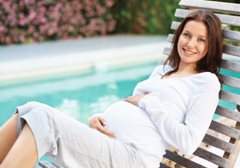 Scientists have discovered why women are more likely to suffer from miscarriages and infertility problems if they try to have babies later in life.
Scientists have discovered why women are more likely to suffer from miscarriages and infertility problems if they try to have babies later in life.
Their study also sheds light on why children born to women in their late 30s and early 40s are at greater risk of Down's Syndrome and other genetic conditions.
The team of British researchers found that as a woman gets older levels of a crucial protein that helps eggs prepare for the moment of fertilisation decline sharply.
The drop increases the risk that an egg will end up with the wrong number of chromosomes and be faulty. The finding raises the prospect of new drugs to help keep eggs healthy as women get older.
Researchers have long known that these eggs deteriorate over time and that babies born to women in their late 30s and early 40s are at greater risk of genetic disorders.
However, the reason why the eggs of older women are less healthy has been unclear. Girls are born with a set of immature egg cells that will last for their entire reproductive life. Each immature egg contains two sets of 23 chromosomes - the chains of DNA that contain instructions on how to build and maintain a human being.
Before the eggs can be fertilised, they must complete a complex process of 'ripening' called meiosis in which half of these chromosomes are ejected.
The resulting egg cell contains only 23 strands of DNA - the genes passed down from a mother to her child. The most important stage of meiosis happens just before ovulation when a large amount of DNA is ejected from the egg. If it goes wrong, an egg can be left with the wrong number of chromosomes.
In the study, published in the journal Current Biology, researchers at Newcastle University and Newcastle Fertility Centre looked at a naturally occurring protein called cohesin, which holds chromosomes together in the egg ready for the ejection of the unwanted DNA.
They used eggs from young and old mice to show that cohesin levels decline gradually as females get older. If cohesin levels are too low, too many or too few chromosomes can be ejected.
Eggs that are defective in this way may fail to develop resulting in infertility, or they may lead to a pregnancy with a high risk of miscarriage, or to the birth of a Down's Syndrome baby.
Study leader Dr Mary Herbert, a reader in reproductive biology at the university's Institute for Ageing and Health, said: 'Reproductive fitness in women declines dramatically from the mid-30s onwards.
'Our findings point to cohesin being a major culprit in this. The aged mice we used are equivalent to a woman in her early-40s. 'Cohesin levels were very much reduced in eggs from older mice and the chromosomes underwent a very messy division resulting in the wrong number of chromosomes being retained in the egg.'
She said further research would be carried out to see why cohesin was lost with age. 'If we can understand this, we will be in a better position to know if there is any possibility of developing interventions to help reduce cohesin loss,' she said.
'Undoubtedly, the best way for women to avoid this problem is to have their children earlier.' A woman's chances of having a baby naturally drop markedly after the age of 35. Doctors say the 'optimum age' for childbearing is between 20 and 35 for mother and baby.
The chances of Down's syndrome - which is caused by the presence of an extra chromosome in an egg - and other chromosomal abnormalities rise sharply at the age of 37.